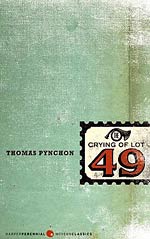
![]() llLeoll
llLeoll
4/16/2013
![]()
The Crying of Lot 49 by Thomas Pynchon
My rating: 5 of 5 stars
Thomas Pynchon manages to squeeze more meaning into 150 pages in The Crying of Lot 49 than most writers can pull off in twice that time. As always, Pynchon is a riot. His names are odd to say the least. Some examples include Oedipa and Much Maas; Mike Fallopian; and Dr. Hllarius And his counter-cultural brain exuberantly draws up conspiracies that make Glenn Beck look sane.
Pynchon also draws a late 60's America that I know only through the movies. Cheech and Chong. "Gimme Shelter." "Easy Rider" -- which I hated. "Woodstock." "Harold and Maude" -- one of my favorite movies of all time. "Eraserhead" -- which still has me scratching my head. And "The Graduate." Etc. He paints the era with a satirical eye. A radio station with the call letters KCUF (a joke that every 13-year-old would find a gas). A half-crazed German shrink who wants to give women LSD as an experimental treatment. And the open highways and urban sprawl that the Interstate 101 (and it's elder sister, the slower 2-lane US 1, the Pacific Coast Highway) defined as it grew into present day California. Electronic music. Pimply-faced teens forming rock bands, called The Paranoids, trying to be the next "new thing." And child-actors, who starred in cheesy 1940's era action films hanging on in LA, but becoming lawyers.
Everything American. But told slant.
Thankfully, Pynchon does hides a lot behind his hair-brained trickery. He does this more effectively than any other writer I can think of save James Joyce. And. like Joyce, Pynchon reveals, mocks, and then covers his tracks every step of the way. And thus, he forces us to be Maxwell's Demon. Separating wheat from chaffe.
And there is wheat here. A lot for such a short and, for Pynchon, approachable book.
The question central to Crying is "What it the nature of reality?" And it's correlary "Is, indeed, reality real? Or is it just information that disintegrates into entropy between our ears?"
Pynchon never answers this head on. But he does so indirectly. Which is why he has his protagonist Oedipa Maas learn about a potentially fictitious underground postal system named W.A.S.T.E., and scrambling around California to find out what she can about it. And connecting W.A.S.T.E. to a similar delivery service burning the European Renaissance called "Trystero." Finding a strange symbol associated with both groups. And then finding that her ex, for whom she is acting as the executor for his will, has a lot of forged postal stamps. That all appear that they may, possibly be linked to W.A.S.T.E.. But, then again, may not...
And through it all, she senses a conspiracy. Something there that is seen but unseen. And she spends weeks pondering and looking for and discovering clues that seem reveal a huge sonspiracy to her:
"She touched the edge of its voluptuous field, knowing it would be lovely beyond dreams simply to submit to it; that not gravity's pull, laws of ballistics, feral ravening, promised more delight. She tested it, shivering: I am meant to remember. Each clue that comes is supposed to have its own clarity, its fine chances for permanence. But then she wondered if the gemlike "clues" were only some kind of compensation. To make up for her having lost the direct, epileptic Word, the cry that might abolish the night."
All the while, Oedipa questions herself. So, after months of tracking leads and seeking help, she goes to her shrink for help. Convinced that her obsession with W.A.S.T.E. is unhealthy.
"I came," she said, "hoping you could talk me out of a fantasy."
Cherish it!" cried Hilarious, fiercely. "What else do any of you have? Hold it tightly by it's little tentacle, don't let the Freudians coax it away or the pharmacists poison it out of you. Whatever it is, hold it dear, for when you lose it you go over by that much to the others. You begin to cease to be."
Of course, her shrink had gone stark raving nutters at that time. And had just spent the past half an hour shooting his office up. Worried that the Israelis are coming after him to lock him up for the war crimes he committed.
But that's Pynchon. Reveal a truth. Mock it. And then cover your tracks...
But in the end, Pynchon never answers our question: "Is W.A.S.T.E. real?" Instead, we are left, hanging. On a chair, next to Oedipa. As the auctioneer begins to auction off the forged stamps that Oedipa is executor for. Waiting to find out who is bidding for it.
At first we are miffed. And then, you realize "The answers are not important. Only the seeking is. Because, without that seeking, you begin to cease to be."
Highly recommended. Short. And not as earth-shattering as Gravity's Rainbow. But still amazing.
Leo Walsh is a writer living in Cleveland, Ohio. Follow him at leo-walsh.com